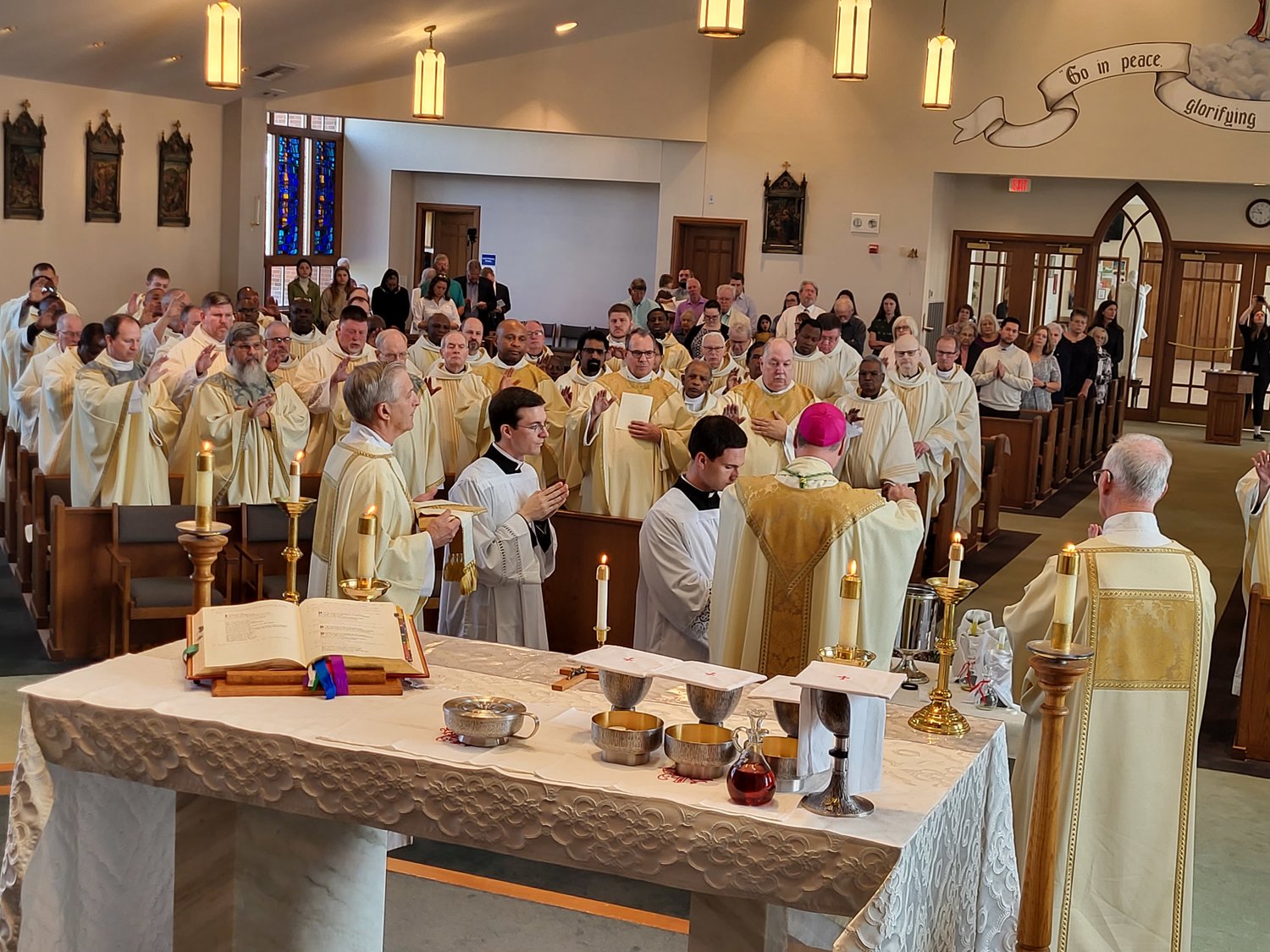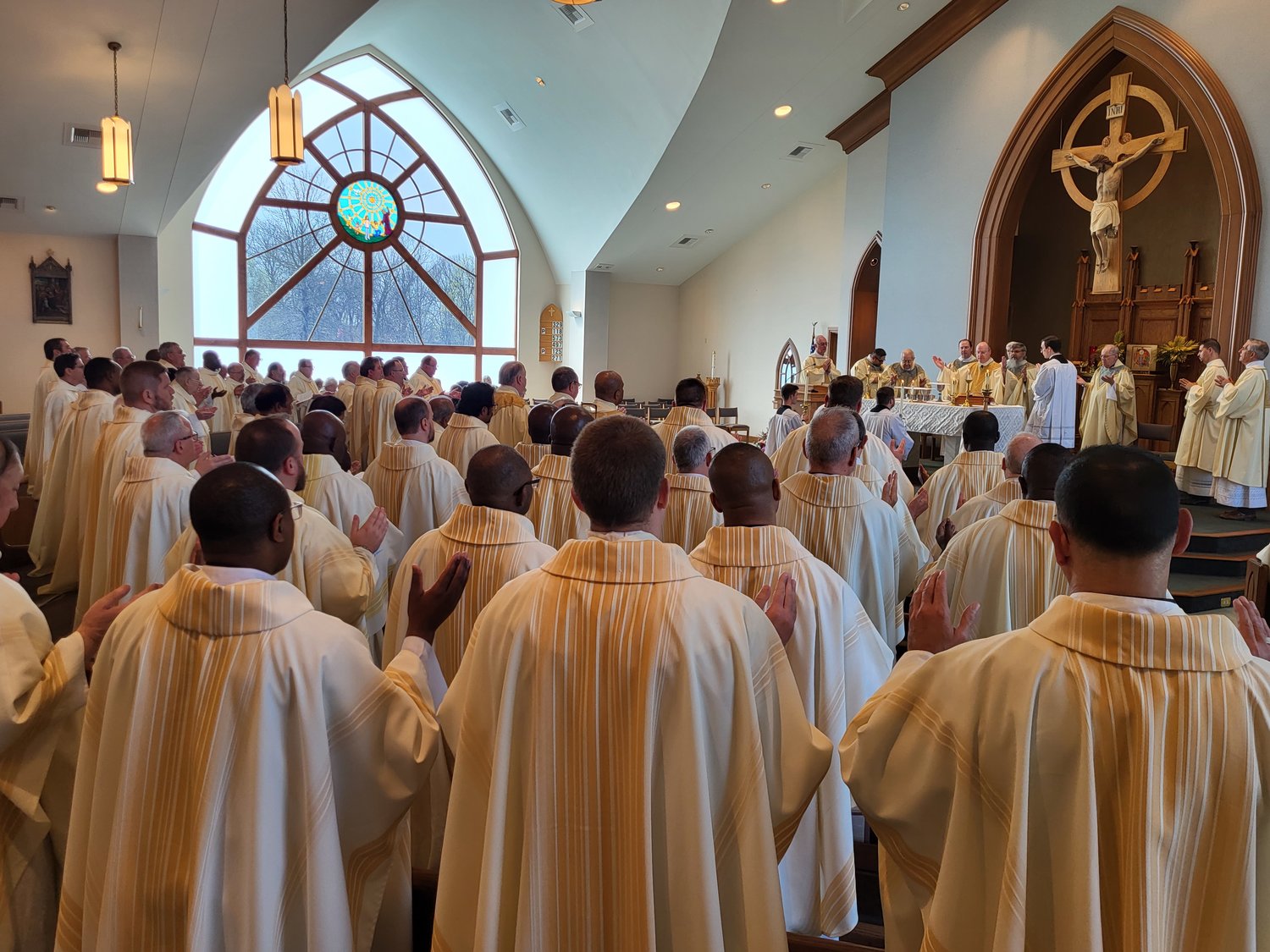Listening, discerning, strengthening relationships were focus of Bishop’s Chrism Mass message

CLICK HERE to see a gallery of photos from this event.
CLICK HERE to read a related article.
Jesus gave us the Sacraments to help us be in right relationship with God and with each other.
This is known as communion.
“The Catholic faith is all about communion,” Bishop W. Shawn McKnight emphasized in his homily for this year’s Chrism Mass, celebrated on the Tuesday of Holy Week.
“The life and mission of the Church is centered on the Eucharist, the Holy Communion that feeds and nourishes our life of faith,” the bishop noted. “Without the Mass, there is no Church — there is no ‘us.’
“Conversely,” he stated, “our communion with God is dependent upon our being in communion with Christ’s Church. Thus, being a Catholic means being in right relationship with others.”
This vibrant relational web, set in motion by Jesus and sustained by the Holy Spirit, forms the basis for the extraordinary rituals carried out at the Chrism Mass each year.
During the Mass, Bishop McKnight blessed the holy oils and consecrated the Sacred Chrism that will be used to administer sacraments throughout the diocese in the upcoming year.
He did so with his predecessor, Bishop Emeritus John R. Gaydos, and the priests of the diocese.
The bishops and priests also renewed the promises they made at their priestly ordination.
About 200 clergy, religious and laypeople attended the Mass.
Seminarians served in various liturgical roles.
Kevin Myers, director of music and liturgy at St. Thomas More Newman Center Parish in Columbia, accompanied the music for the Mass.
A year of favor
The Chrism Mass is a visible bond between the Sacraments, the people who receive them, and those who administer them throughout the year.
“Today we celebrate in a special way the one Priesthood of Jesus Christ, who was anointed with the Spirit to repair our broken relationship with God and to heal our fractured humanity,” said Bishop McKnight.
The bishop called to mind this year’s priestly jubilarians: Father Donald Antweiler, who is celebrating the 50th anniversary of his ordination; and Father Daniel Merz and Father David Veit, who are observing their 25th priestly anniversaries this year.
“We’re very grateful for your ministry to us,” Bishop McKnight told the jubilarians. “Thank you for serving us as priests.”
He also presented papal honors to three longtime servants of the diocese: Connie Schepers, who retired last year after serving in many roles, most recently as chancellor; Deacon Ray Purvis, who retired after playing a large role in the preparation and ongoing formation of deacons; and Sister Suzanne Walker, who served as a teacher and principal in Monroe City for 48 years.
“To bring glad tidings”
The Chrism Mass is usually celebrated in the Cathedral of St. Joseph in Jefferson City but was offered this year in St. Andrew Church in Holts Summit while the Cathedral is being extensively repaired and renovated.
In his homily, Bishop McKnight spoke of the ongoing discernment process through which Pope Francis is leading the Church, with the goal of becoming a more “synodal Church — “a Church that journeys together through Communion, Participation, and Mission.”
“These three themes of communio, participatio, and missio echo the three goals of co-responsibility (communion), the spirituality of stewardship (participation), and parishes as recognized centers of charity and sanctuaries of mercy (mission) in our diocesan pastoral plan,” Bishop McKnight noted.
He emphasized that the ongoing synodal process is not about changing doctrine or any other specific outcome, except one — “to change how we are Church, the methods of how the Church makes decisions and responds to the pastoral needs of our time; to discern with the Holy Spirit instead of deciding things on our own.”
He spoke of Catholic stewardship as “trusting enough in God’s providence to give more of ourselves in our time, talent and treasure.”
He talked about how the power and authority of the Holy Spirit must be exercised in a co-responsible fashion, “by which clergy and the laity have a mutual respect for the diverse charisms we have and share.”
“A culture of co-responsibility allows for a more effective, harmonious, and integrated missionary effort,” he stated.
Finally, with more people engaged in carrying out the mission of the Church and doing so in cooperation with one another, “we can fulfill our dream for parishes being recognized as centers of charity and sanctuaries of mercy in their local communities,” the bishop said.
Jesus recognized his own mission and that of the Church in the prophecy of Isaiah: to bring glad tidings to the poor, to the lonely, to the sorrowing, to the depressed and anxious.
“By our anointing and consecration with the Holy Spirit, we have the ability, we have the capacity to share in Christ’s work of redemption which transforms the way people see and live their lives,” said Bishop McKnight.
Bearing gifts
Four deacons presented the oils for blessing and consecration.
Deacon Larry Hildebrand, who assists the pastor of Immaculate Conception Parish in Loose Creek and St. Louis of France Parish in Bonnots Mill, presented the Oil for the Catechumens.
Deacon Mike Berendzen, coordinator for Columbia Catholic Hospital Ministry, who also assists the pastor of St. Francis Xavier Parish in Taos, presented the Oil for the Sick.
Deacon Robert Schowengerdt, who assists the pastors of St. George Parish in Linn, Our Lady Help of Christians Parish in Frankenstein, Most Pure Heart of Mary Parish in Chamois and Assumption Parish in Morrison, presented the fragrant balsam for the Oil for Chrism.
Deacon Matthew McLaughlin, director of the Rolla Newman Center, who also assists the pastor of St. Patrick Parish in Rolla and Immaculate Conception Parish in St. James, presented the Oil for Chrism.
Bishop McKnight said the Oil of Catechumens, the Oil of the Sick, and the Chrism oil “resonate, each in their own way, with the threefold ministry of Christ — Prophet, Priest and King.”
The Oil of Catechumens is used for infants during the baptismal ceremony, and for the anointing of the elect during the Rite of Christian Initiation of Adults (RCIA) as they prepare to be baptized.
It designates all members of the Church as learners and gives them a protecting strength against evil.
The Oil of the Sick is used for healing in the sacrament of Anointing of the Sick.
Sacred Chrism, named for Christ, is used in Baptism, as well as Confirmation, the ordination of priests and bishops and the dedication of churches and altars.
“Oh how we look forward to the use of the Chrism Oil, freshly consecrated at this Mass, in the rededication of our Cathedral on May 5!” said Bishop McKnight.
Priestly people
The bishop told the assembly that the blessing of the three sacred oils should remind everyone of his or her own anointing by the Holy Spirit and to share in Christ’s mission to heal wounded relationships and draw all people to himself.
As the Church is centered on the Eucharistic sacrifice of Christ, it is also dependent on the presence of those who share in the sacramental Priesthood.
“We priests shoulder together the special mission we have received from Jesus Christ to preserve the apostolic communion of his flock,” Bishop McKnight stated.
He urged all the priests to work toward greater unity among themselves, the local Church and the Church Universal.
After the bishops and priests renewed their promises, Bishop McKnight asked the laypeople to “pray for your priests, that the Lord may pour out His gifts abundantly upon them and keep them faithful as ministers of Christ, the High Priest, so that they may lead you to Him, Who is the source of salvation.”
He also asked the people to pray for him to be faithful to the office of bishop and to be conformed more fully into the image of Christ, “the Priest, the Good Shepherd, the Teacher and Servant of all.”
Comments
Other items that may interest you
Services
The Catholic
Missourian
2207 W. Main St.
Jefferson City MO 65109-0914
(573) 635-9127
editor@diojeffcity.org







